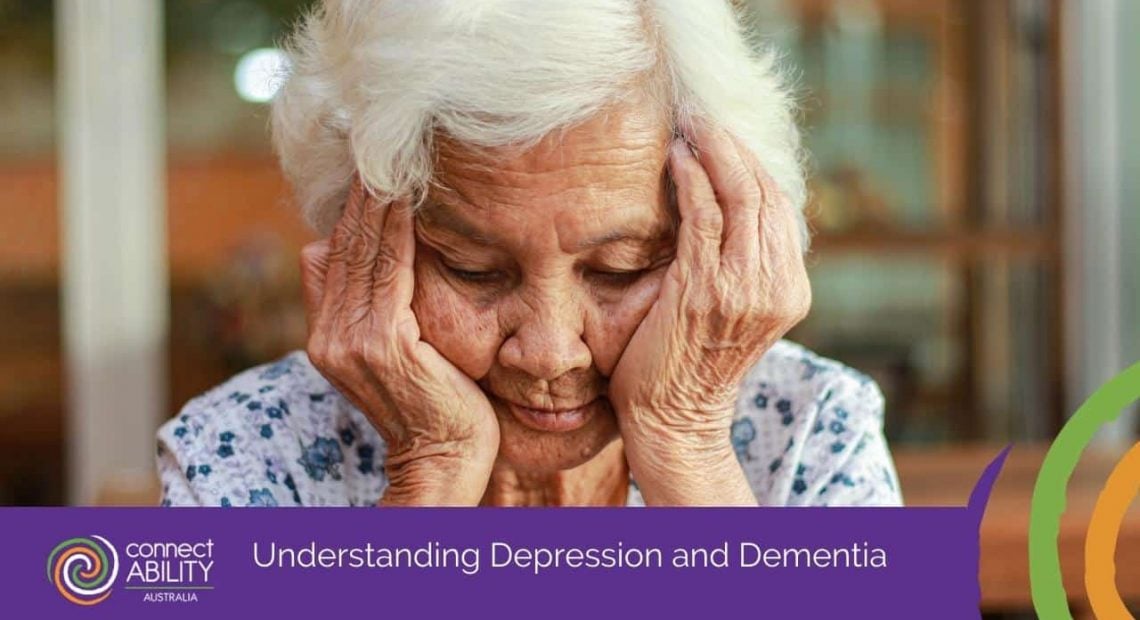Recognising the causes, presentation and effects of depression in elderly people with dementia
Depression is surprisingly common in those with declining health and an increasing need for support, such as the elderly; however, it is often misdiagnosed in those with dementia because many of the signs and symptoms may be indicative of either condition, making it more difficult to obtain a correct diagnosis.
Here the team at ConnectAbility will look at the potential causes of depression in the elderly and ageing, and briefly examine the interplay between dementia and depression in this population group.
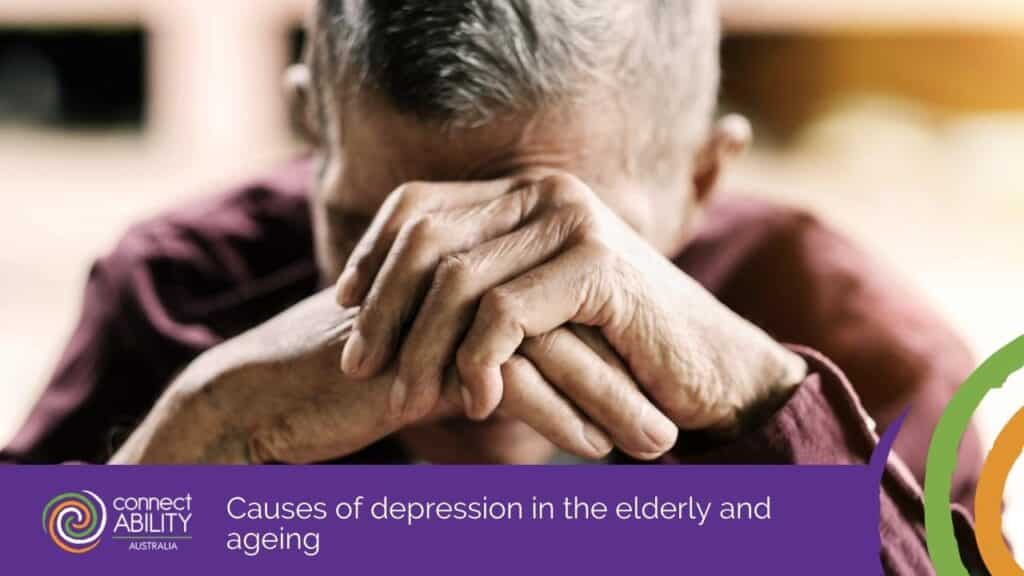
Causes of depression in the elderly and ageing
There are many reasons that our elderly loved ones with dementia may struggle to maintain good mental health or develop depression. Research has shown that mental health is influenced by interacting biological, social, and psychological factors, including (but not limited to):
- level of social support and social interaction.
- health/disability status, and access to and/or use of health and medical services.
- living arrangements.
Social supports and social interaction
According to the World Health Organisation (WHO), social interaction such as contact with relatives and friends and relationships formed through various social networks, has a protective and restorative effect. Regular engagement and interaction can protect against the onset or recurrence of mental illness and enhance recovery in the wake of a depressive episode. The ABS’s 2007 survey showed a far higher prevalence of mental health disorder in those who did not have regular contact with family and friends.
We live a busy world, where full time employment and the duties of running a household and raising children can leave little time for anything else. As such, many ageing and elderly adults living in the community have less regular contact with family and friends, particularly as people become more advanced in years and begin to lose many of their peers and friends to age-related disease and illness, such that they can begin to feel isolated.
Likewise, there are frequently times when an elderly person living in an aged care facility sees less of their family – particularly when the ageing person’s family is satisfied that their loved one is being well-cared for and having their needs met.
Furthermore, in a world governed by COVID-19 restrictions, where lockdowns and limited contact are now frequently the norm for residents in aged facilities, there is even less opportunity for much-needed contact with family and loved ones. Such limitations on social interactions can significantly affect mental health and contribute to increased incidences of depression in the elderly population.
Health status
Research has shown that a person’s health status can significantly affect their mental health. Chronic health conditions that restrict participation in social activities or impede a person’s mobility or ability to undertake self-care activities, can have a profound impact on a person’s state of mind. Limitations placed on opportunities for physical activity and social interaction can hasten the onset of dementia and increase feelings and symptoms of depression.
Living arrangements
While living in an aged care facility provides ageing and elderly adults with some level of social support, and aged care facilities aim to encourage social interaction, the activities provided and the people with whom the ageing person is forced to interact are not necessarily those the ageing person would choose for themselves.
This can lead to friction in the living environment, with little means of avoiding those people and activities that irritate them. Consistent exposure to stressful living arrangements can help to increase feelings of depression and may aggravate signs and symptoms of dementia.
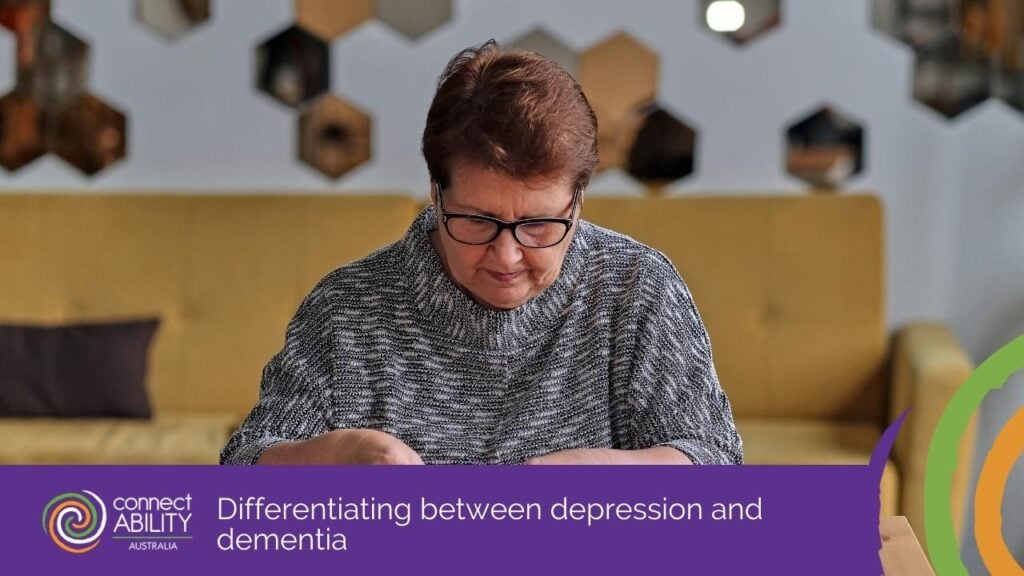
Differentiating between depression and dementia
Research suggests that an estimated 20-30% of people with dementia also suffer from depression. Although many of the signs and symptoms of depression and dementia are similar, which can sometimes make it difficult to differentiate between the two conditions, there are often subtle differences in the way depression presents itself in people with dementia.
For example, the symptoms of depression:
- May not last as long.
- May be less severe.
- May come and go more easily.
A person with dementia or Alzheimer’s disease who is also suffering a depressive episode may also be less likely to talk about, plan or attempt suicide. Additionally, the cognitive impairment experienced by those with dementia can often make it difficult for them to clearly express their feelings of sadness, hopelessness or other depressive feelings or symptoms.
For these reasons dementia is often missed, or misdiagnosed as some form of functional psychiatric disturbance, including depression – and vice versa. That is why it is important to have the older person who is showing signs and symptoms of depression or dementia thoroughly assessed by a medical professional, so a correct diagnosis can be obtained.
Accurately diagnosing dementia and/or depression
To assist medical professionals to accurately diagnose depression in people with dementia and Alzheimer’s, formal guidelines for diagnosis have been established. Though these guidelines are similar to the general diagnostic standards for major depression, they include criteria such as irritability and social isolation while reducing the emphasis on verbal expression.
These guidelines form the basis for the CAMDEX-R assessment – a diagnostic tool for identifying dementia and differentiating it from other common disorders and processes of ageing, including mental disorders of the elderly.
The CAMDEX assessment includes:
- A review of the older person’s medical and psychiatric history.
- Neuro-psychological testing.
- Mental state examination.
- Brief physical examination.
- An interview with a close relative.
The interview portion is executed to establish whether there has been any discernible change in the older person’s personality, behaviour, and cognition. This person may also be asked to rate the level of assistance the older person requires to complete activities of daily living (ADLs) and the strain they personally feel in providing care to the older person.
Mini-Mental State Exams
The older person’s treating medical professional may also perform a Mini-Mental State Exam (MMSE) which tests the older person’s orientation, attention, language, and recall, and is considered a generally reliable and valid screening tool for assessing cognitive impairment and diagnosing dementia – or differentiating it from depression.
It may also be helpful to ask the older person’s doctor for a referral to a geriatric psychiatrist, who specialises in diagnosing and treating depression in older adults.
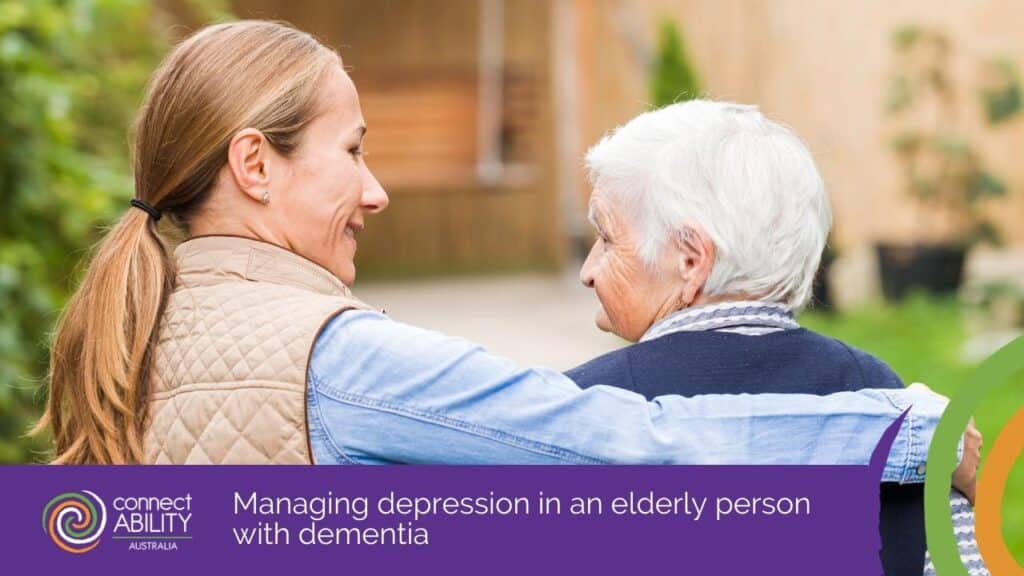
Managing depression in an elderly person with dementia
Possibly the most important things you can do to assist with managing the behaviour and mental state of your ageing loved one are:
- Encourage and assist the elderly person to undertake regular gentle exercise, preferably in the morning.
- Monitor the elderly person’s diet and ensure they eat regular and nutrient-dense meals. If the older person lives alone, consider engaging a home care service from an NDIS provider such as ConnectAbility that can provide domestic assistance, including assistance with grocery shopping and meal preparation.
- Identify the ageing person’s physical and psychological rhythm and implement a daily routine to accommodate this: schedule tasks that require more energy, effort, or motivation (for example, attending to personal hygiene and grooming) for the elderly person’s “best” time of day.
- Acknowledge the older person’s feelings without exercising judgment and reassure them that they are loved, respected, and appreciated, and that you are there to provide whatever support they need.
- Identify activities that the person particularly enjoys or finds soothing – for example, playing games, watching a certain TV show, reading a book, listening to music, or playing an instrument, or visiting favourite places or people – and assist your elderly loved one to do these things more frequently.
- Encourage the ageing person to connect and interact with other people. If their mobility is limited, you could assist them to access transport services that will take them on outings or to go shopping.
If you are the older person’s main caregiver, and caring for them is becoming a strain, contact a support service that can assist you to access respite care, provide advice on finding or choosing a residential aged care facility, or access in-home care and assistance. You may also want to consider finding a support group, to enable you to connect with others who are in similar situations and dealing with similar issues.
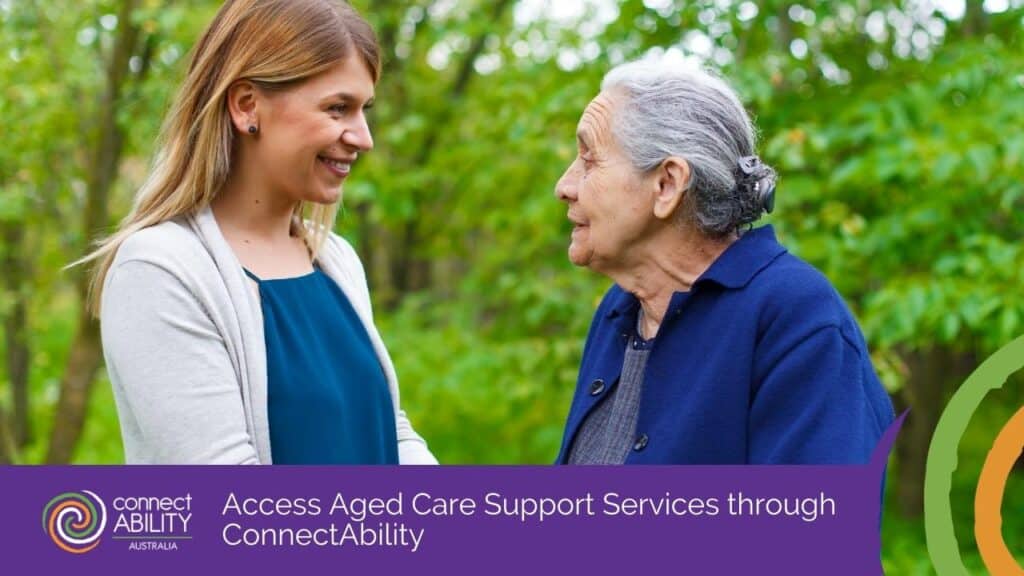
Access Aged Care Support Services through ConnectAbility
ConnectAbility Australia provides all the aged care advice and support services you need, helping you to find and access appropriate in-home care services or Supported Independent Living services that are perfectly matched to your, and your elderly loved one’s needs.
If you would like more information on how ConnectAbility can help an older person exhibiting symptoms of depression or dementia to feel more supported, connect with other seniors, and regain a sense of purpose, please call us on 02 4962 1000 (Newcastle) or 02 4349 3700 (Central Coast). Alternatively, you can email us at contact@connectabilityaus.org.au or complete our contact form to have a ConnectAbility representative contact you.

